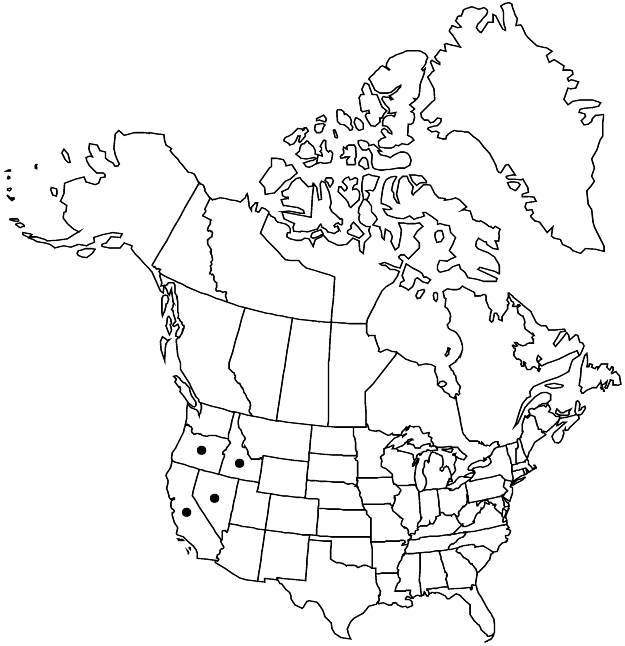Difference between revisions of "Eriogonum ochrocephalum"
in W. H. Brewer et al., Bot. California 2: 480. 1880.
FNA>Volume Importer |
RevisionBot (talk | contribs) m (Bot: Adding category Revised Since Print) |
||
| (5 intermediate revisions by 3 users not shown) | |||
| Line 1: | Line 1: | ||
{{Treatment/ID | {{Treatment/ID | ||
|accepted_name=Eriogonum ochrocephalum | |accepted_name=Eriogonum ochrocephalum | ||
| − | |accepted_authority=S. Watson | + | |accepted_authority=S. Watson |
|publications={{Treatment/Publication | |publications={{Treatment/Publication | ||
|title=in W. H. Brewer et al., Bot. California | |title=in W. H. Brewer et al., Bot. California | ||
|place=2: 480. 1880 | |place=2: 480. 1880 | ||
|year=1880 | |year=1880 | ||
| + | }} | ||
| + | |special_status={{Treatment/ID/Special_status | ||
| + | |code=E | ||
| + | |label=Endemic | ||
}} | }} | ||
|basionyms= | |basionyms= | ||
| Line 19: | Line 23: | ||
-->{{Treatment/Body | -->{{Treatment/Body | ||
| − | |distribution= | + | |distribution=Calif.;Idaho;Nev.;Oreg. |
|discussion=<p>Varieties 2 (2 in the flora).</p><!-- | |discussion=<p>Varieties 2 (2 in the flora).</p><!-- | ||
| − | --><p>Variety ochrocephalum is occasionally seen in rock gardens, and < | + | --><p>Variety ochrocephalum is occasionally seen in rock gardens, and <i></i>var.<i> calcareum</i> is worthy of cultivation.</p> |
|tables= | |tables= | ||
|references= | |references= | ||
| Line 44: | Line 48: | ||
-->{{#Taxon: | -->{{#Taxon: | ||
name=Eriogonum ochrocephalum | name=Eriogonum ochrocephalum | ||
| − | + | |authority=S. Watson | |
| − | |authority=S. Watson | ||
|rank=species | |rank=species | ||
|parent rank=subgenus | |parent rank=subgenus | ||
| Line 51: | Line 54: | ||
|basionyms= | |basionyms= | ||
|family=Polygonaceae | |family=Polygonaceae | ||
| − | |distribution= | + | |distribution=Calif.;Idaho;Nev.;Oreg. |
|reference=None | |reference=None | ||
|publication title=in W. H. Brewer et al., Bot. California | |publication title=in W. H. Brewer et al., Bot. California | ||
|publication year=1880 | |publication year=1880 | ||
| − | |special status= | + | |special status=Endemic |
| − | |source xml=https:// | + | |source xml=https://bitbucket.org/aafc-mbb/fna-data-curation/src/2e0870ddd59836b60bcf96646a41e87ea5a5943a/coarse_grained_fna_xml/V5/V5_550.xml |
|subfamily=Polygonaceae subfam. Eriogonoideae | |subfamily=Polygonaceae subfam. Eriogonoideae | ||
|genus=Eriogonum | |genus=Eriogonum | ||
| Line 63: | Line 66: | ||
}}<!-- | }}<!-- | ||
| − | -->[[Category:Treatment]][[Category:Eriogonum subg. Eucycla]] | + | --> |
| + | |||
| + | [[Category:Treatment]] | ||
| + | [[Category:Eriogonum subg. Eucycla]] | ||
| + | [[Category:Revised Since Print]] | ||
Latest revision as of 17:04, 6 November 2020
Herbs, matted, scapose, 0.5–4.5(–5) × 0.5–3 dm, glabrous or glandular, grayish. Stems matted or spreading, occasionally with persistent leaf bases, up to 1/5 height of plant; caudex stems matted or absent; aerial flowering stems scapelike, erect, slender, solid, not fistulose, (0.5–)1.5–4.5(–5) dm, glabrous, rarely slightly floccose, or glandular below inflorescence. Leaves basal, fasciculate in terminal tufts, sometimes 1 per node and sheathing up stem 1–4 cm; petiole 1–4(–5) cm, tomentose; blade oblanceolate or lanceolate to elliptic, oblong, or ovate to obovate, (0.6–)1–3.5(–4) × (0.3–)0.5–1.5 cm, densely tomentose abaxially, only slightly less so adaxially, margins plane. Inflorescences capitate, 1.5–2.5 cm; branches absent; bracts 3, scalelike, narrowly triangular, 1–2.5 mm. Peduncles absent or erect, slender, 0.1–0.5(–0.6) cm, glabrous. Involucres 5–8 per cluster, turbinate to campanulate, 3.5–5.5(–6) × (1.5–)2–4.5(–5) mm, rigid, floccose at least on teeth, occasionally glandular, rarely glabrous; teeth 6–8, erect, 0.5–1 mm. Flowers 1.5–3 mm; perianth yellow, glabrous or weakly glandular abaxially; tepals connate proximally, monomorphic, broadly oblong; stamens exserted, 2.5–3.5(–4) mm; filaments pilose proximally. Achenes light brown, (1.5–)2–3 mm, glabrous.
Distribution

Calif., Idaho, Nev., Oreg.
Discussion
Varieties 2 (2 in the flora).
Variety ochrocephalum is occasionally seen in rock gardens, and var. calcareum is worthy of cultivation.
Selected References
None.
Key
| 1 | Scapes glandular at least proximal to inflorescence; ne California, nw Nevada | Eriogonum ochrocephalum var. ochrocephalum |
| 1 | Scapes glabrous or, rarely, slightly floccose; sw Idaho, se Oregon, wc Nevada | Eriogonum ochrocephalum var. calcareum |